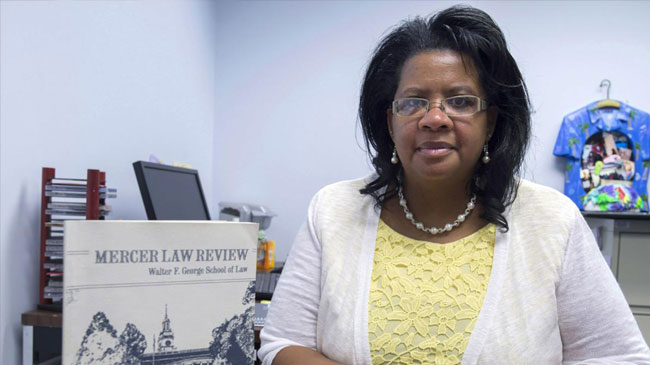
Angela A. Allen-Bell
On November 6, 2018, we will decide the most important Criminal Justice Issue of our lifetime. This is because of the multitudes of people effected by Louisiana’s Non-Unanimous Jury Law, either directly or indirectly. Louisiana voter will be asked: “Do you support an amendment to require a unanimous jury verdict in all non-capital felony cases for offenses that are committed on or after January 1, 2019?” If you believe in justice and care about liberty, join me in voting “yes” to Amendment 2.
This law was placed in Louisiana Constitution in 1898, after the Civil War, when a supremacist ideology and an insatiable appetite for free labor still prevailed despite the federal government having forced an end to slavery. At this 1898 Constitutional Convention where the Chairman of the Judiciary Committee openly acknowledged that they met “to establish the supremacy of the White race” –the Non-Unanimous Jury Law was formally adopted with two bad intentions in mind: (1) to obtain quick convictions that would usher people into Louisiana’s quick convict leasing system (as a replacement for free slave labor); and (2) to ensure African-American jurors would not block convictions of other African- Americans.
In the years since, a host of unintended consequences have resulted, such as a disproportionately high number of plea bargains, mass incarceration, voter suppression and disenfranchisement, wrongful convictions, discrimination against and marginalization of minority and women voters and public distrust. When these things are considered, it becomes clear that the upcoming vote is about much more than a contemptable racial history of the law. Louisiana’s Non-Unanimous Jury Law involves the highest of all compacts: The Constitution of the United States. For it is the Sixth Amendment to the Constitution of the United States, which guarantees an impartial jury. What’s at issue on November 6, 2018 is the Constitution itself and the protections it promises.
At no prior point in history have the people of Louisiana been asked to register their informed preferences on this issue. The 1898 change was not done by the people. The 1973 change (from 9 of 12 to 10 of 12) was not done with any disclosure to voters about the history or implications surrounding this law (as was the case in Oregon, the only other state allowing non-unanimous juries in criminal cases, when they changed the law in 1934). Allowing a vote of a fully informed population would properly reflect our collective desires about who we are as a State. We have been robbed of this opportunity.
In all federal courts and in forty-eight of the fifty states, a unanimous vote of twelve is required in felony cases. While it is true that Louisiana and Oregon are outliers, it is not true that two states violate the Sixth Amendment is worse. For example, Oregon does not allow a non-unanimous jury to convict a person of first-degree murder; Louisiana does (when the death penalty is not at issue. If Louisiana’s sentence weren’t life imprisonment at hard labor without benefit of parole, probation or suspension of sentence, this might not be so alarming.
In the case of the death penalty, Louisiana requires the unanimous vote of twelve. This suggests an attempt on the part of the legislature to guard the literal taking of life by insuring unanimity exists in capital cases. The current system undermines that protection when it comes to the non-literal taking of a life (referring to those who will spend their natural life in custody and die there due to the imposition of a life sentence for first degree murder). A vote in favor of Amendment 2 will cure this often-overlooked aspect of the law, which likely resulted from a time where no grades or degrees of homicide in Louisiana and all homicides where then considered death penalty cases.
There now exists over forty-five years of credible research on group thinking. Much of this research simply did not exist when this issue was last entertained by the SCOTUS in 1972. The research teaches that unanimous verdicts are more reliable, more careful and more thorough because a rule which insists on unanimity furthers the deliberative process by requiring the minority view to be examined and, if possible, accepted or rejected by the entire jury. Over the years, a number of states have considered abandoning their unanimity requirements. After study and deliberation, change has always been rejected. Why is that? If non-unanimous juries are good, why aren’t most states using them?
For the dismissive who feel this vote is about criminals and, therefore, not worthy of attention or support, I humbly offer a few observations. The Sixth Amendment’s impartial jury promise has nothing to do with convicts or criminals. Instead, it’s in place for the protection of the innocent-those accused of a crime. This means, when we vote, we are voting to guard the rights of the innocent, not convicts. Second to this, a public safety concern underlies this vote because fast convictions that are not the result of careful deliberations often result in the inducement of plea bargains or result in wrongful convictions. When a person is wrongfully convicted, the guilty party remains at-large. When a person plea to a crime they did not commit out of fear of Louisiana’s non-unanimous jury system, the same results.
In both instances, a public safety concern ensues. And there are often overlooked concerns about the manner in which this system impacts economic development. There are well-founded fears about individuals and businesses relocating to or even visiting Louisiana because of the risk they assume should they ever have the misfortune of involvement with the state criminal courts. Alongside taxes, school options, housing costs there exists a risk of a Sixth Amendment violation that simply does not exist in most states.
What’s at stake in November is the growth of a reputation of the state, as well as the sacred and cherished matters of liberty, freedom and justice. These are no small matters. It is our moral responsibility as much as it is our civic duty as members of a larger human rights community and participants in a Democracy to serve Jim Crow his overdue eviction notice on November 6, 2018. Vote “yes” to Amendment 2!
Recommended For You.






Be the first to comment